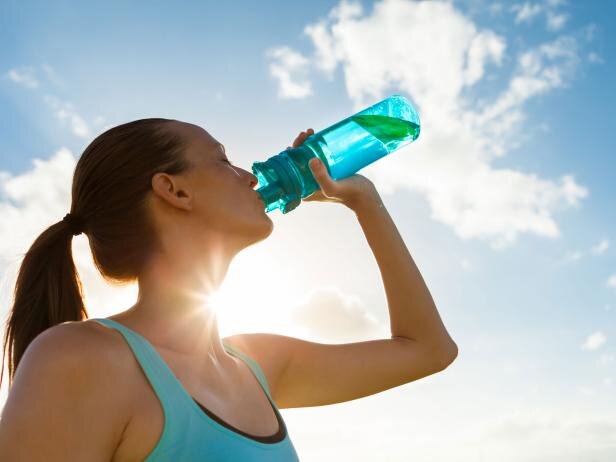
Don’t Let Dehydration Flush Your Performance by Dawn Litrenta, Timonium Store Lead & Middle Distance Training Coach
Wednesday, July 7, 2021
Training in the summer is much different from training in the winter months. It is much harder to run well when it’s hot and it takes time to get our bodies acclimated to the heat. Perceived effort is greater in the heat and it is not in your head…It may have felt harder to run on a hot day than it did on previous workouts. This is due to the fact that heat can impact runners at a physiological level through various means, including dehydration, increased heart rate and reduced blood flow (and subsequently oxygen) to the muscles used for running. Dehydration in runners may lead to fatigue, headaches, and muscle cramping.
Moral of the story…staying hydrated is critical to your running performance and, more importantly, for preventing heat-related illnesses. It is extremely important to get into the routine of taking in fluids regularly throughout your workouts. Also, when you live in a high humidity state, such as Maryland, it is harder for your body to cool itself, which is just one more reason to keep well hydrated.
Pre-Run Hydration:
-
If you’re doing a long run or race (more than 8 to 10 miles), it’s important to make sure you’re well-hydrated during the few days leading up to your long run.
-
Drink plenty of water and nonalcoholic fluids. Not only does alcohol dehydrate you, but it can also prevent you from getting a good night’s sleep.
-
An hour before you start your run, try to drink about 16 ounces of water or other non-caffeinated fluid.
-
To make sure you’re hydrated before you start running, you should drink another 4 to 8 ounces right before you start.
Drinking on the Run:
-
If you’re looking for a general rule of thumb for fluid consumption during your runs: You should take in 4 to 6 ounces of fluid every 20 minutes during your runs.
-
During longer workouts (90 minutes or more), some of your fluid intake should include a sports drink (like Gatorade) to replace lost sodium and other minerals (electrolytes). If you have a sensitive stomach and sports drinks do not agree with you, this can also be achieved by products such as endurolytes which are small pills that include the sodium and minerals lost during long runs.
-
Also consider your equipment and how you are carrying your nutrition and hydration on training runs. How much water/nutrition and if you carry a phone, etc. on your run will dictate which is the best option for you.
-
Vest
-
Waist Belt
-
Hand Held
-
Post-Run Hydration
-
Don’t forget to rehydrate with water, a sports drink, or a recovery drink after your run.
-
You should drink 20 to 24 fl oz. of water for every pound lost. You should also be drinking plenty of fluids throughout the day after your long run.
-
A headache, upset stomach, or extreme tiredness can be from dehydration. If you start to feel bad after a long run try drinking 8-12 fl oz. of water or sports drink every hour. This will help re-hydrate your body.
Here is a quick comparison on some of the hydration products Charm City Run sells in-store and online:
-
Nuun– 360mg of Sodium, 13mg of Calcium, 25mg of Magnesium, and 100mg of Potassium; Comes in multiple flavored tablets that you add to water.
-
Hammer Nutrition Endurolyte– 40mg of Sodium, 60mg of Chloride, 50mg of Calcium, 25mg of Magnesium, 25mg of Potassium, Vitamin B6, Manganese, and L-Tyrosine; Comes in a capsule of powder to chase with or add to water.
-
Salt Stick– 215mg of Sodium, 22mg of Magnesium, 11mg of Potassium, and 63mg of Vitamin D; Comes in a capsule to chase with or add to water.
So this summer and beyond, please make sure you are staying well hydrated!
Interested in learning more about hydration? Join us next Wednesday from 6:00 – 7:00 PM for a special Hydration Clinic with Coach Chad at our Timonium store.
